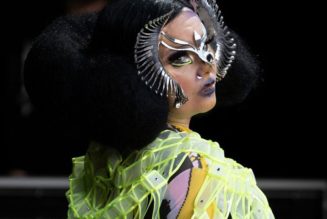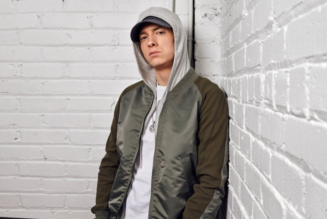
It is clear that we are in the midst of a Y2K revival. The resurgence of flip phones, low rise jeans, and bedazzled crop tops has ushered in a new era of sweet, childhood nostalgia. Online, users on social media platforms such as Instagram and X, (formerly known as Twitter,) reminisce about songs from the late 1990s and early 2000s as a way to connect and reflect on music that made them feel good. One of these songs, “Take Me There” by Blackstreet and Mýa featuring Blinky Blink and Mase, was the focal point of these conversations. The song, which could be easily released today, brought up memories of watching the music videos on MTV Hits, hearing it in the background of The Rugrats Movie, or Blackstreet and Mya’s performance of the song on The WB’s (now CW) Sister, Sister.
Article continues after video.
Regardless of where or when you heard the song, the resounding segment among users was the same: Mýa was and is still that girl. The D.C. native who made her debut in 1998 was one of the leading voices in the pop R&B wave of the late ‘90s and early ‘00s. From “Take Me There” to “Case of My Ex” to “Lady Marmalade,” Mýa achieved worldwide recognition and success through a series of chart topping singles and critically acclaimed albums. Moodring, her third studio album, which turned 20 this July has been cited as inspirations by singers such as Normani, Chlöe, and Dawn Richards.
After the release of Liberation, her fourth studio album, the singer went independent and has continued to release music under Planet 9, her record label ever since. A decision that has not only allowed her to take ownership of her career as a musician, but provided her an opportunity to blossom and bloom into a steward of the R&B genre. “I’ve witnessed my own evolution as a person but also as a songwriter and producer, now an engineer, an executive producer, financier, independent boss,” Mýa says. Under her leadership, the singer garnered her third GRAMMY nomination for Smoove Jones, her seventh studio album.

Mýa’s journey in the music industry is a testament to her faith. In an ever-changing business, like the music industry, she continues to express gratitude for the opportunity to entertain and sing to masses across the world. “To still be going and never lose your love or allow anything to come in between why you started in the first place and remembering roots of gospel music, of your father’s band in the living room and holding onto that so that it carries you through into your next phase and your next phase and your next phase of life to get to the real purpose at the end of the day,” she says.
Twenty-five years in the music industry, Mýa now feels that she has all of the components to start executing and living out her purpose: a mission to serve. “How are you making lives better?,” she says. Yes, she acknowledges that she is a participant in the music industry. An industry she entered as a “little pop R&B girl from the DMV with a dream,” now she feels this moment in her life is an opportunity to apply the knowledge and wisdom she has accumulated over the years.
“I’m just so excited about this next phase, which is really truly the beginning of my actual career in my mind because everything else was just an education and opportunity,” she says. As she speaks with deep, instinctive clarity about her time in music, her words read as a student who has learned from several, different teachers. Though now she is in the position to teach and model how one continues to evolve and grow in music, Mýa prefers to be a student. “I’m still learning, but the evolution is evident,” she says.
When asked to name this new chapter of her life, the singer says she will save her response, because it is the title of her forthcoming album. Yet, she affirms that this chapter feels right and that everything is what it is supposed to be. That her life at this moment is what she wants it to be.
She speaks with the awareness and confidence of the impact and power of her music. At the time of her debut, Mýa was able to interact with fans one-on-one at autograph signings and promotional appearances at record stores; relics of a time where music was purchased and sold on cassette tapes and cds, but pivotal movements that fostered a relationship between artists and fans. Now with the advent of social media, Mýa feels a greater appreciation towards those who share and engage with her music online.
“To connect and be able to have the opportunity to do so with your supporters or anyone that you might have touched is confirmation, reassurance, motivation, inspiration, and you pay it forward from there,” she says. “You never know what one decision in your lyric and the difference that it can make makes until you hear the memories, sometimes the overcoming in a person’s personal life and trials, and that is a beautiful, that’s the beautiful part of what athletes, what any public figure, anyone that has a platform, you don’t necessarily have to be a celebrity recording artist [has.] We all have the ability to make an impact.”

Her impact felt online on social media and her resounding roster of sold out tour dates is also felt offline in times spent with her godchildren, nieces, and nephews. She admires their honesty and willingness to be open about what’s affecting them, what inspires them, and how they’re navigating through life. She admires the wisdom that comes with being a youth.
As of late, she has found herself in conversation with her younger self from twenty-five years ago. Her younger self serves as a source of inspiration, pushing the singer to go for it, regardless of others opinions or definitions of success. “I see my younger self prior to the music industry, having so many of those moments where I proved to myself over and over and over again that I was capable, that I was worthy, that I have the discipline,” she says. Even now, she pulls from her younger self, specifically her bravery, to get through.
“You return to that child, that student, and that’s the space that you create and protect for yourself, so that you always hold on to the reason you started but also tap into what that means,” she says. “Have more of it around you and step into those worlds and that carries you over because there is a lot of noise out here and sometimes you can second guess yourself and go against your intuition, your God given gift, it’s all innate. I think protecting that space is very, very important.”
And she is not alone. In recent years, as more and more people go to therapy to engage in inner child work or inner teenage work, in order to heal and model better life behaviors for themselves and younger generations, Mýa is an example of that. She has defined happiness for herself. She has created a life and career that is defined by her expectations not corporations, financiers, or accolades, but Mýa. It is that belief system that amplifies her legacy. Though social media and an ongoing Y2K revival does help in reintroducing her to newer generations, those who grew up with her still maintain a genuine, authentic love towards the girl from the DMV with a dream.










